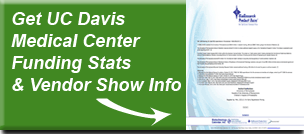Remember the character of Pigpen in the comic strip Peanuts? He walked around within a cloud of dust and dirt. Well, according to University of California Davis microbiologist Jonathan Eisen, we all live within our own aura of microbes --10 times as many microbial cells as human cells!--and that's probably a very good thing for our health. It sounds counterintuitive at first, but not all microbes are bad. We've come to realize intestinal biota are good for digestion and colon health (among other things), but the outside of our bodies is also host to vast colonies of microbes that are increasingly proving to be vital cohorts of our immune system.
Eisen gave the sometimes startling, always engaging short lecture, titled Meet your Microbes, at the TEDMED conference extravaganza held in Washington DC last April (read our blog on the event), and it has just been published online as a TEDTalk (video below). As a faculty member in the UC Davis Medical Center Dept. of Medical Microbiology and Immunology, Eisen and his Lab look at the “phylogenomics of novelty” in microbes. He also has an appointment in the Dept. of Evolution and Biology, and is a researcher with the Joint Genome Institute of the DOE. His Lab is physically located within the UC Davis Genome Center.
[TEDTalk taped in April 2012, published July 2012: Meet your Microbes]
Pathogens are obviously not the only type of microbe--they're just the harmful ones that we hear about the most. Thousands of different kinds of microbes cover our bodies and inhabit them, in a symbiotic relationship that benefits us in ways we are just now beginning to understand. Dr. Eisen's lab looks at the DNA of our microbes, which is the best way to identify them, and which is also how we know there are so many and they are so diverse. When we kill off our microbiome components through the excessive use of antibiotics, antibacterial soaps, sanitizers, and chemicals (think of what's under your sink), we risk getting sick. Our biota protect us, sometimes confering immunity through familiarity, the way a vaccination does, and other times just taking up real estate that a pathogen might find attractive. Eisen tell his audience:
The human microbial environment is a functioning organ. Treat it carefully and with respect.
It's not all about what not to do, though. Current studies at UC Davis and other centers of microbiome research are looking at how microbes are passed on in the birth canal and through breast milk to give newborns a headstart. Transplant surgery procedure no longer calls for completely sterilizing the organ and killing the biota that live in it. Some radical old school veterinarians are known to make something called "poo tea" from the feces of a healthy animal and administer it to a sick one that isn't responding to normal treatment. Something called a "fecal transplant" is also being studied, since fecal matter is "a zoo of microbes," some of which are necessary to support healthy bodily function. If that sounds unsavory, it is, but it also points to the larger issue of our cultural preoccupation with hyper-cleanliness. Assuming that sterile is better may be making us sick by leaving us vulnerable to pathogens our own microbes might have resisted.
What Dr. Eisen, his lab, his colleagues at Davis and elsewhere are looking to produce through their research into the human microbiome is something like "A Field Guide to the Microbes: we are them, they are us." When we more thoroughly understand what the bugs are that live with us and constitute our unique microbial cloud, we may be able to treat illness through probiotic supplementation, but it likely won't be as simple as this one in, that one out. Phylogenetics, which is Eisner's field, is defined as the study of evolutionary relations among groups of organisms, which is discovered through molecular sequencing data and morphological data matrices (by Wikipedia). What we will know through this research is more about how this complex symbiotic relationship evolves through time and circumstance in individuals and populations.
For earlier blogs of ours on the human microbiome, as well as the biome of buildings such as hospitals, follow this link.
Biotechnology Calendar, Inc. is a full service event marketing and planning company producing on-campus, life science research tradeshows nationwide for the past 20 years. We plan and promote each event to bring the best products and services to the best research campuses across the country. Twice each year, typically in January and again in June, we hold our popular Sacramento/UCDMC BioResearch Product Faire™ event on the UC Davis Medical School campus. Click the button below for funding information on this market and the upcoming 2013 shows:
Be sure to check out the second half of our 2012 Show Schedule too.


